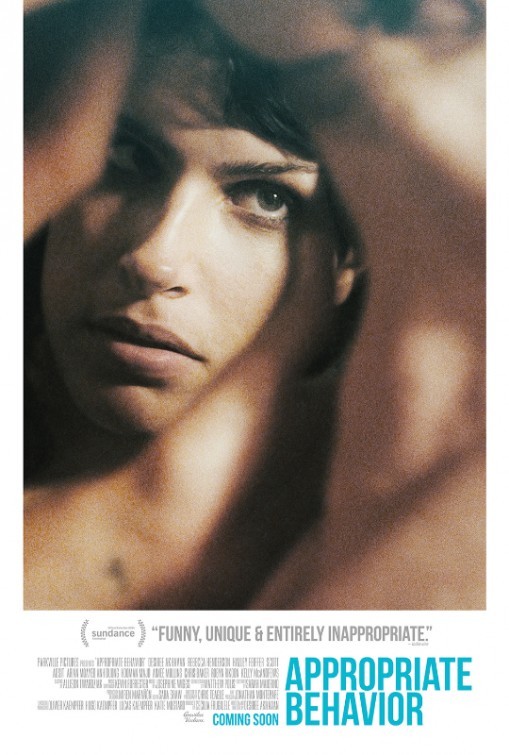
Full disclosure: I’m actually sorta family friends with Desiree Akhavan.
We’re both Iranian-Americans who grew up in Northern New Jersey, and our parents have been friends for years. It seems like yesterday that me and Desiree were chatting about cinema in the kitchen of my family home, and talking about her then-recent admission to NYU’s graduate film program. Cut to six years later, and she's scored an Independent Spirit nomination for her first feature-length screenplay (which she also directed), APPROPRIATE BEHAVIOR. She has a successful, hilarious webseries (called THE SLOPE) under her belt, and just this past Sunday, popped up on HBO’s GIRLS in a prominent guest spot.
Her first film is an intimate look at a young bisexual of Iranian descent (played by Desiree) as she navigates her conservative Iranian family, a bizarre job teaching film theory to five-year-olds, and, worst of all, an ugly, brutal break-up. It has carefully-crafted, rapid-fire dialogue and a focus on human behavior and intimacy that rivals most well-established indie filmmakers’, as well as a brave, hilarious performance from Desiree herself.
Read on for Desiree’s thoughts on NYU film school, her film’s path to the big screen, and the prospect of teaching five-year-olds how to shoot on Flip Cams.
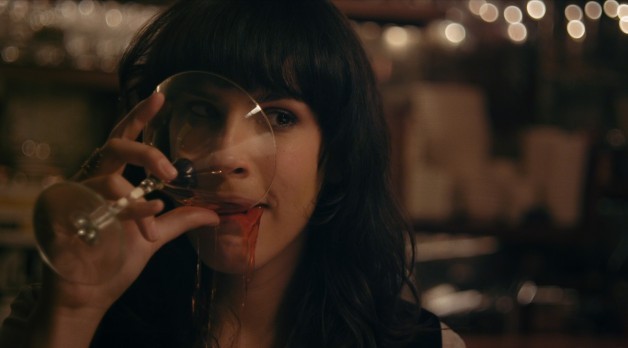
VINYARD: Last time I saw you was about six years ago. You were getting ready to go to NYU for grad school. Let's just talk about then 'till now. You go to school, and how long until you start making your webseries?
DESIREE: I made my webseries in my third year of classes at school.
VINYARD: Okay. What was your experience like until then?
DESIREE: It was really positive. I made a lot of shitty films that no one will ever see, but I needed to do that. i remember in my interview saying like, "I need to come here so I can fail. I'd like to fail a little bit because I think I need to become…better." I think that's the best way to learn, to keep making things that kinda suck. I went to school, I made a buncha shorts, and I also worked on a lot of shorts. I did a lot of script supervising, I did a lot of 1st A.D.-ing. Those were the jobs I did mostly, because my technical skills are so shit. I also learned about all stages of production. I was the world's worst sound mixer, worst boom operator. I did a short stint as a D.P. and it was terrible. So then, in my third year of classes, I started making this webseries which I co-directed with another director (Ingrid Jungermann). That experience totally freed me up to do the kind of work I wanted to do, instead of thinking about the NYU way of doing things. Which was funny because NYU was incredibly supportive of the show and loved it, but then for some reason, in my own head I had this idea- I think actually it was peer-induced- that we all thought we had to shoot on Super 16, and we all thought that good films were made with a certain mise-en-scene, and a certain attention to detail…
VINYARD: More visual, rather than conceptual…
DESIREE: Yeah, but also even conceptually like high-concept. Or like incredibly subtle, like you were more coy with your audience. But that was more student work that I kept seeing, it wasn't professors pouring it down my throat. When I made the first episodes of THE SLOPE, which at the time wasn't even a webseries, we were just making shorts, but they played so well and suddenly I thought, "I wanna chase this wave." It was so easy, it was so effortless. We were just having fun. We were making jokes. And that led to the film.
VINYARD: When you said you were making a few films that no one should ever see or no one will ever see, were they features or shorts?
DESIREE: Oh, shorts, are you kidding me?
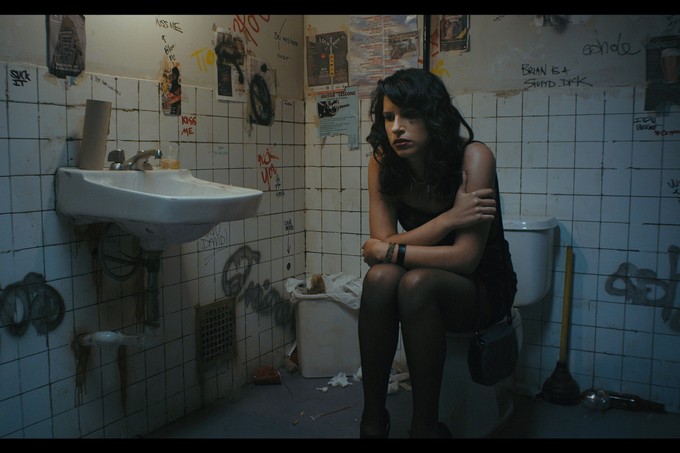
VINYARD: Okay, yeah. Right away, from the first episode of THE SLOPE, you're starring in it.
DESIREE: Yes.
VINYARD: And you said you were doing it for homework.
DESIREE: That was the reason we were starring in it, because it was homework.
VINYARD: Had you been acting in other people's stuff?
DESIREE: No. I studied acting as a teenager, and in elementary school. Growing up, I always loved acting, and I studied it, and my summer school experiences were always acting-based. But once I turned 17, 18, I realized that wasn't really something I could pursue. Even before that, I knew I couldn't pursue it professionally, so I put it aside, and thought that I would be a playwright for a long time. Then in undergrad, I got into film acting.
VINYARD: It's interesting to hear that you were going to be an actress and a playwright, because the two things about your movie that really stood out to me, that really kinda blew me away, was how carefully it was written- and your webseries too, it's very dialogue-based, and very much about human behavior- and the fact that you're acting in every scene.
DESIREE: I know, that was insane.
VINYARD: It's very daunting. Did that just come out of your attachment to the material, or did you just not find anyone that could do it?
DESIREE: We didn't even hold auditions. The whole challenge of the film was how…personal it was. I mean, it's not autobiographical. The events of the film never took place. I never walked down the street with a strap-on, I never stalked an ex, I never met someone on New Year's Eve and had that conversation. Those things didn't happen, but I saw this as an opportunity to dramatize the very best and the very worst of me, and to take it to the most heightened level. It was a sort of "Choose Your Own Adventure." What if this insane version of me who had no filter and who would never take no for an answer went on a bunch of adventures? So my producer and I worked together to carve out like, "What would her family do? How would she live that double life between her Iranian family and her gay community, even though she fits into neither one of them?" It seemed really silly to hire this better-looking version of myself to do it, which you always see directors do: hiring someone who looks exactly like them, only slightly hotter, and doing a good impression of the director.
VINYARD: Right, like Woody Allen. Every Woody Allen movie he's not in, it's like a guy like Owen Wilson or John Cusack acting like Woody Allen.
DESIREE: Oh, I totally see Owen Wilson being a Woody Allen doppelganger. He sort of aged out of playing himself.
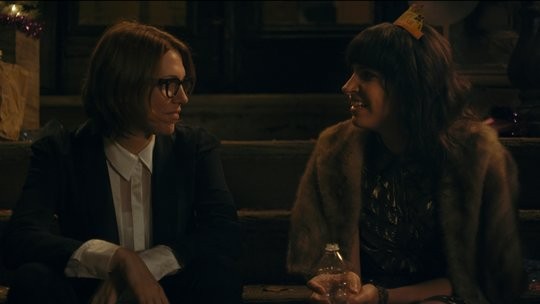
VINYARD: What about the rest of your cast? How did you find them? Were they people you'd worked with in school?
DESIREE: No. Only Halley Feiffer who plays Crystal, the blonde girl, she's an old friend of mine from high school. We met at 14, and have been friends ever since. We produced our first plays together in high school, and she's a playwright and actress now, professionally. She's someone I wrote that part for. The role of Maxine (Desiree's character's ex-girlfriend, played by Rebecca Henderson) was a woman I knew through Halley, an actress whose work I had seen and really loved, but she's really feminine in real life and I didn't know if she would be right for this character. It turns out she did this amazing thing called "acting," where she became non-feminine when the cameras were rolling. She's nothing like her character at all, so I was surprised when we did the scenes together and she transformed.
VINYARD: She's great. It's funny to hear you describe her as very feminine, because she's great in the role, and very natural. And you have Baymax from BIG HERO 6 in your movie, Scott Adsit, in a handful of scenes. How did that come about? Was he still on 30 ROCK?
DESIREE: No, 30 ROCK had just ended. With Scott, we asked his agent, and I think they said no at first, but he has a really lovely girlfriend. This is how it happened. It was Sandra (Bauleo), his girlfriend, who's a comedian as well, who made him watch THE SLOPE, and then he did it, but at first they were like, "Fuuuuck no, you can't have Scott for this. For your first movie? Your ultra low-budget…"
VINYARD: He wasn't a doll in every kid's living room back then.
DESIREE: Is there a Scott Adsit doll?
VINYARD: Yeah, he's the voice of Baymax in one of the big Disney movies this year.
DESIREE: I know that, but that hadn't come out yet. It was in the process- he had a top-secret Disney project that we didn't know what it was, but we knew it was Disney and we were really excited.
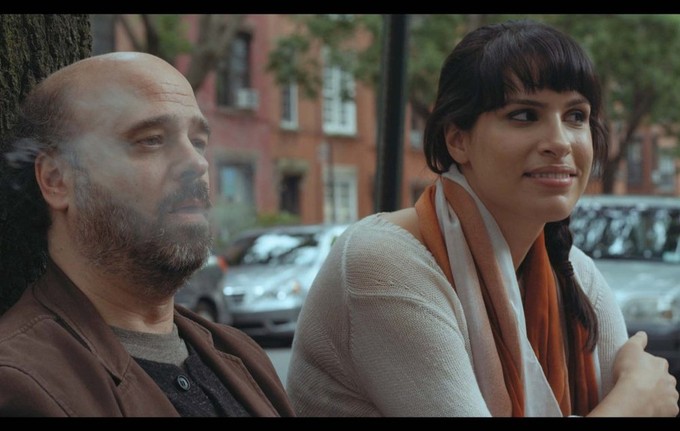
VINYARD: You said you were a playwright before-
DESIREE: Not a professional one!
VINYARD: But you had written plays. Were they similar, or equally personal, sort of a similar vibe to APPROPRIATE BEHAVIOR?
DESIREE: Yes. Comedies, but also very personal about silly things that had happened to me.
VINYARD: Is it a priority for you to explore, to center it around your Iranian lifestyle, around things you sort of understand personally? Obviously you're the lead in both THE SLOPE and this film, so obviously the character's going to be Iranian and have an Iranian background, but is it imperitive for you to play that up and talk about that? Because it isn't something you see a lot of, even in independent film, or in media in general.
DESIREE: It is, and it isn't. I have a project that is not about any of this, that's inspired by a young adult novel about a girl in Montana. That story moved me, and I wanted to shoot it, and it felt so personal to me even though it's not about my life at all. But then again, we also have projects that are very much personal about a young Iranian girl. And one day I would love to tell the story of my mom's journey here. Those are my pipe dreams, but those films are going to be more expensive to shoot. You lead up to those budgets. You write what you can afford to make, and I'm very conscious of how much things cost, and I don't think bigger than my means. I'm very practical in how I want to shoot things. That's how the webseries happened. It was like, "How can we shoot something for free?" And then this film was like, "How can we shoot something with everything at our disposal," which was like New York actors, and these shitty Brooklyn locations. Politically, yes, I love that I'm putting more content out there that involves Iranians, but I'm not exclusive, and I have stories that I want to be shedding more of a light on the Iranian experience that aren't NOT WITHOUT MY DAUGHTER. But it's not my only priority.
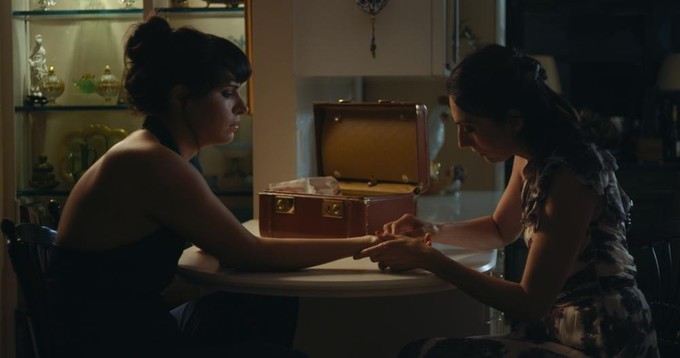
VINYARD: That's the thing. I think that's a really cool thing that you're doing, because, like I said before, that's not something that you get a lot of. How did you arrange the financing for the movie? Was it through the webseries?
DESIREE: Well, the webseries is what gave us the credibility to keep going. When I say us, I mean my producer (Cecilia Frugiuele) and I. Cecilia was not involved in the webseries. (to Cecilia, who's sitting with us) You can chime in whenever because we're talking about financing. We met nine-and-a-half years ago. I did a year abroad in London, when I studied film, and we made our first film together. What happened was, every six months after I left London, we would fly to see each other. She got a graduate degree in producing, I got my degree in directing, and we knew we wanted one project to come together, but it never quite did until THE SLOPE started getting attention in The Guardian a few times in a row. Cecilia asked me if I had a feature version, which I did at that time, and she read it, and she said, "Together, I think we can expand the scope of this story, and I could finance it with my company, Parkville."
CECILIA: The great thing of financing through private equity is that in the U.K. there is an investment scheme which is really favorable in terms of tax breaks, and these kinds of things. We knew that off of the strength of THE SLOPE, we could find backers.
VINYARD: So the money was mostly from England?
CECILIA: Yeah, from private investors.
VINYARD: When did this all happen? When did you conceive of the project, when did you finally get the financing, when'd you start shooting?
DESIREE: I wrote the first draft in January of…2013 or 2012?
CECILIA: 2012. I joined you in May.
DESIREE: Yes. So January 2012, I wrote the first draft. Cecilia joined me in May, and for the next year, we were prepping. She and her company were raising the finance, and we went over to London for a month and did some rewrites together. We were just workshopping and workshopping and workshopping it 'till our shoot date, which was June of 2013. Then we premiered at Sundance exactly two years after I started writing.
VINYARD: Wow. Did you think being in London had any impact on the writing process? Having a little bit of removal from the scene, from New York, and from Brooklyn specifically?
DESIREE: I don't know. I think it could've been anywhere. I think it was working with Cecilia. Having my partner there. We would just sit on our couch for hours and act it out. Cecilia has played every role in this movie, beautifully.
CECILIA: Stealing the show.
DESIREE: I don't know why we did casting, to begin with. We isolated ourselves, and the fact that we had that time really changed the script. That was when we wrote a bunch of scenes that took it from a series of scenes to a cohesive story.
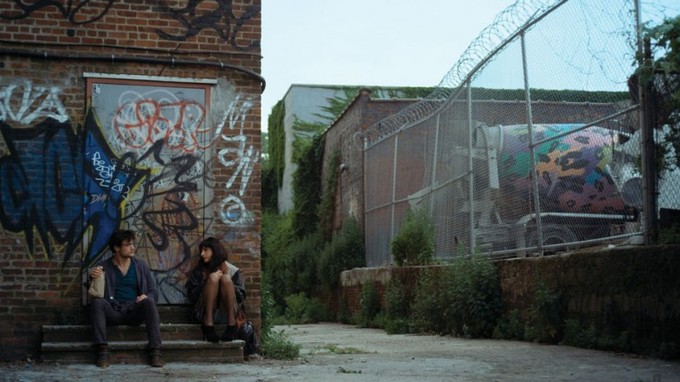
VINYARD: One of the things that makes it cohesive is the structure. You start with basically the last scene of the movie, and you chop it up, and there's very little obvious indication of where you are chronologically, you just have to figure it out by the context. Was that something you had planned, or was that something that kind of happened later in the writing or maybe in the editing?
DESIREE: It happened once Cecilia came onboard. My first draft was written very quickly, and it was very different. It was linear. When Ceciclia came onboard, she said, "I think we should include the family." There wasn't a family involved. She was like, "I think we should talk about her job. I think we should include this family and this job, and then work around the breakup." So then I went back to work, and I wrote all these scenes. It didn't make sense to make it linear, so I was like, "Okay, what if we start with the break-up." That's where ANNIE HALL came in. It was really easy to look at this film, and that began like that. 'Cause I started to brainstorm, like, "What films are about couples that are not together?" There aren't that many out there, it's usually people falling in love, having one obstacle and then overcoming that one obstacle. So that's how that all came together.
VINYARD: So when you were conceiving it, it was always about a break-up? That was the core, and all the other stuff came later?
DESIREE: It did, because I wrote it while I was making THE SLOPE. That was so much about a couple, and I was so inspired by that experience. My first draft of it, I was gonna shoot by taking out a $10,000 loan. My initial plans for the film were so modest, that I never saw it having the scope and the range that it did, but that was purely financial. Then Cecilia said, "I think I can raise a modest budget for this, so we can have more than two locations and two actors." This is my thesis for school. I was gonna make it so small. Then the idea of having all of that room to play, then it was like, "Let's add in, let's add in, let's add in." Initially, the kernel was just this relationship, but now that I look at it, it doesn't seem to be very much about a relationship as much as about this…woman's journey.
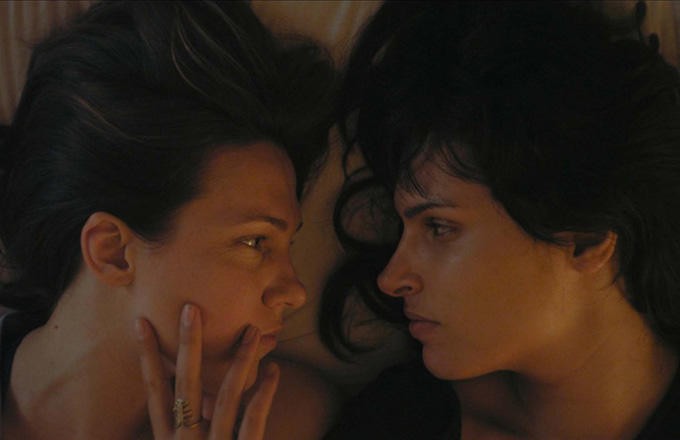
VINYARD: And that's one thing I really like about the movie, it's not about one thing. It's not about her coming out to her parents, it's not about her breaking up with her long-term girlfriend, it's about her. It's about a life, it's about the moment. And it feels more natural as a result. How did the film-school stuff come about, with Shirin teaching the kids? Do they actually have anything like that?
DESIREE: Yes.
VINYARD: Ay yai yai. Had you seen something like that and it just inspired you?
DESIREE: I taught a class to five-year-olds. But let me say that it was a good class, I had a really great boss, I had fantastic colleagues. I parodied it in a ridiculous way, but the concept to me was ridiculous. Actually, the kids had fun and everything, it was a cool thing. It was actually a cool thing.
VINYARD: Did they make their own farting video?
DESIREE: No, because I was a terrible teacher. If I had been a better teacher, we would have made a farting video. I was a really untalented teacher, and while I was writing this I was doing that job, and I felt so bad that I wasn't able to communicate to these kids or give them what they wanted. I turned myself into a glorified babysitter. But I had colleagues who did incredible work. And those kids weren't rich. Actually it's not a judgement on bougie Park Slope values. Kids should be creative. Kids should have outlets, and right now digital tools are like…Fisher-Price style, you know? They're meant for kids to play with. Flip-cameras are meant for kids, so are GoPros. And kids are so much more technically savvy, it makes sense for them to make their own movies. If I had a kid, I would put them in the filmmaking class for five-year-olds. It's really not a judgment on that, even though it sounds absurd. The judgment was that I was a terrible teacher, and I had no talent for it. I really did those kids a disservice, and that's how that ended up in the script.
VINYARD: What did they shoot on?
DESIREE: Flip-cameras.
VINYARD: Okay, and the editing was all done by you?
DESIREE: I did it. I mean, they're five. That's also a very difficult age for boys. My class was all boys, and it's a tough age to wrangle them. It really is. They're all over the place.
VINYARD: Sure. To go back to NYU for a second. Did you meet the rest of your crew at school?
DESIREE: No. My editor (Sara Shaw) and I were int he same class and school, and she’s the only crew member that stayed with me. I love her. I love my classmates too, but what happened was…most people, you have to work on their films for them to work on your films, and I’m so untalented as a crewmember that no one wanted me to be on their crew, so I couldn’t ask them to be on mine. But we paid Sara for the film, so it was fine.
You can stream APPROPRIATE BEHAVIOR right now, or catch it at one of these theaters currently showing it across the country.
